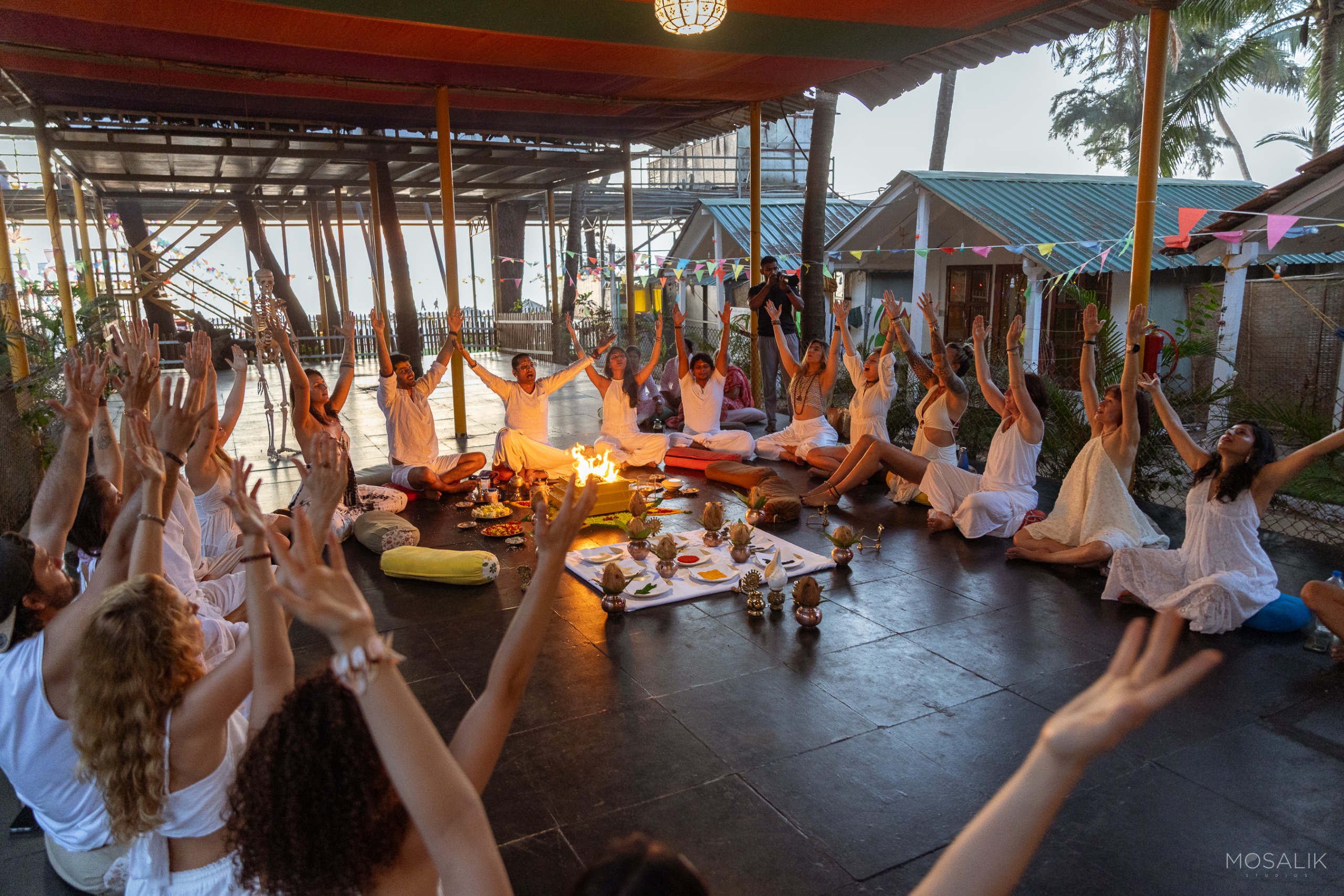What Is Kripalu Yoga?
Kripalu Yoga, named after the Kripalu Center for Yoga & Health in Massachusetts, is a yoga practice that emphasizes the cultivation of self-awareness, compassion, and the integration of mind, body, and spirit. Founded by Amrit Desai, Kripalu Yoga evolved from traditional hatha yoga and embraces a holistic approach to well-being.
Where did Kripalu Yoga begin?
The origins of Kripalu Yoga can be traced back to the teachings of Swami Kripalvananda, also known as Bapuji, an Indian yoga master. Amrit Desai, inspired by Bapuji’s teachings, founded the Kripalu Center for Yoga & Health in 1983. The center became a hub for the practice and teaching of Kripalu Yoga, contributing to its growth and popularity.
Key Principles and Kripalu Yoga Practices
Kripalu Yoga is grounded in several key principles that guide practitioners towards self-discovery and mindful living:
- Witnessing and Acceptance: Practitioners are encouraged to observe their thoughts and sensations without judgment, fostering self-awareness and acceptance.
- Flow and Meditation: Kripalu Yoga incorporates gentle movements and meditation, allowing for a free flow of energy and a deeper connection with the present moment.
- Self-Inquiry: Through self-inquiry practices, individuals explore their inner landscape, emotions, and beliefs, promoting personal growth and transformation.
What is the Purpose of Kripalu Yoga?
The primary purpose of Kripalu Yoga is to facilitate self-discovery, inner transformation, and the integration of yoga into daily life. The practice encourages individuals to explore their inner selves, leading to a greater understanding of their thoughts, emotions, and physical sensations. Ultimately, Kripalu Yoga aims to foster a sense of mindfulness, compassion, and holistic well-being.
Benefits Of Kripalu Yoga
Engaging in regular Kripalu Yoga practice offers a variety of benefits for the mind, body, and spirit:
- Enhanced Self-Awareness: The practice of witnessing thoughts and sensations cultivates self-awareness, promoting personal growth and introspection.
- Stress Reduction: Kripalu Yoga incorporates relaxation techniques and mindfulness, contributing to reduced stress levels and increased mental clarity.
- Improved Flexibility and Strength: The gentle movements and asanas in Kripalu Yoga help enhance flexibility, strength, and overall physical well-being.
- Emotional Well-Being: Self-inquiry practices and mindfulness contribute to emotional balance, fostering a sense of inner peace and resilience.
Can beginners do Kripalu Yoga?
Absolutely! Kripalu Yoga is accessible to beginners, and its welcoming approach makes it suitable for individuals of all fitness levels. Classes often cater to a diverse range of participants, providing variations and modifications to accommodate different abilities. The practice encourages individuals to honor their bodies, embrace the present moment, and progress at their own pace.
Is Kripalu Yoga for me?
Deciding if Kripalu Yoga is right for you depends on your desire for self-discovery, mindfulness, and a holistic approach to well-being. If you appreciate a practice that extends beyond physical postures, focusing on the integration of mind and spirit, then Kripalu Yoga may resonate with you. It offers a transformative journey that invites individuals to explore their inner selves, fostering a sense of presence, compassion, and overall wellness.
Kripalu Yoga, a form of Hatha Yoga that emphasizes self-discovery, self-inquiry, and compassionate self-acceptance, has a unique history rooted in the teachings of Swami Kripalu and the evolution of the Kripalu Center for Yoga & Health. Want to join yoga – Contact Now
Evolution of Kripalu Yoga?
The origins of Kripalu Yoga can be traced back to Swami Kripalu, also known as Swami Kripalvananda. He was born in 1913 in Gujarat, India, and displayed an early interest in spiritual practices. Swami Kripalu became a monk in the Saraswati order and devoted himself to a life of spiritual exploration and service.
Swami Kripalu’s teachings were deeply influenced by the philosophy of Bhakti Yoga, emphasizing the path of devotion and love for the divine. He believed in the transformative power of yoga to awaken spiritual consciousness and sought to integrate traditional yogic practices with a modern, accessible approach.
In the 1960s, Swami Kripalu traveled to the United States and began sharing his teachings with Western audiences. He initially settled in the Northeast, where he attracted a group of dedicated followers who were drawn to his inclusive and heart-centered approach to yoga. Swami Kripalu’s teachings focused on self-awareness, self-regulation, and the cultivation of a loving relationship with oneself and others.
Swami Kripalu did not develop a formal system of yoga postures, but his emphasis on self-inquiry and mindfulness laid the foundation for what would later become known as Kripalu Yoga. He encouraged practitioners to listen to their bodies, honor their individual needs, and explore the connection between mind, body, and spirit.
In 1972, the Kripalu Ashram was established in Sumneytown, Pennsylvania, providing a residential space for individuals to immerse themselves in yogic practices and teachings. The ashram became a hub for Swami Kripalu’s disciples and a center for the dissemination of his unique approach to yoga.
After Swami Kripalu’s passing in 1981, the ashram underwent a transition under the leadership of Amrit Desai, a senior disciple. During this period, the teachings of Kripalu Yoga continued to evolve, incorporating elements of classical Hatha Yoga while maintaining a focus on self-awareness, meditation, and mindfulness.
In 1994, the Kripalu Center for Yoga & Health moved to its current location in Stockbridge, Massachusetts. The center shifted its emphasis from being primarily an ashram to becoming a retreat and educational facility open to people of all backgrounds and levels of yoga experience. This transition marked a significant expansion of Kripalu Yoga’s accessibility and appeal.
Under the leadership of Amrit Desai and subsequent directors, the Kripalu Center became known for its diverse programming, including workshops, training programs, and retreats in yoga, meditation, holistic health, and personal growth. Kripalu Yoga Teacher Training programs were established, providing a structured curriculum for individuals interested in becoming certified Kripalu Yoga instructors.
One of the distinctive features of Kripalu Yoga is the concept of “Kripalu Yoga in the flow of life.” This approach encourages practitioners to take the insights gained on the mat into their daily lives, fostering a holistic integration of yoga principles. The practice involves three stages: Stage 1, focusing on body alignment and safety; Stage 2, exploring the flow of breath and movement; and Stage 3, cultivating a meditative and compassionate awareness.
Over the years, Kripalu Yoga has gained popularity for its inclusive and adaptable approach, making it accessible to individuals of all ages, body types, and fitness levels. The emphasis on self-inquiry, mindfulness, and the integration of yoga into daily life has resonated with many seeking a holistic and transformative practice.
The teachings of Kripalu Yoga have also influenced other styles of yoga and holistic wellness practices. The Kripalu Center continues to thrive as a destination for those seeking personal development, spiritual growth, and a supportive community.
Embark on the path of self-discovery and mindfulness with Kripalu Yoga – a practice that nurtures the connection between mind, body, and spirit.



